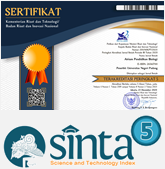Effect of Biology Module with Scientific Approach Equipped with a Glossary in discovery learning models Against Learning Competencies of Class X Students of SMAN 1 Pariaman
Abstract
The low learning competencies of students is caused by several problems encountered during the teaching and learning process, including the problems that the first textbook used has not involved students actively playing a role in the learning process, learning is still monotonous and the student notebook is incomplete. One of the efforts that is done to increase students’ learning competencies is to apply a biological module with a scientific approach equipped with a glossary in discovery learning models. This research used a Randomized Control Group Posttest Only Design. The population is all student of class 1 SMAN 1 Pariaman. Sampel was taken by using purposive sampling technique. The control class uses textbooks with learning models Discovery learning and experimental classes use biological modules with discovery learning models. Instrument The research instrument used was in the form of a learning competency test, an assessment of attitudes and skills in the form of an observation sheet. The t-test results revealed that knowledge competencies t count > t table (7.06> 1.7), t test results 'competency skills t count < t table ( 0,925< 1.7), and t test results' competency attitude t count < t table (0,76< 1.7). This shows that the hypothesis is accepted in the aspect of knowledge that is not followed by aspects of skills and attitudes. So, it can be concluded that the biological module with a scientific approach equipped with a glossary in the discovery learning model that has significance for learning competencies in the aspects of student knowledgeThe low learning competencies of students is caused by several problems encountered during the teaching and learning process, including the problems that the first textbook used has not involved students actively playing a role in the learning process, learning is still monotonous and the student notebook is incomplete. One of the efforts that is done to increase students’ learning competencies is to apply a biological module with a scientific approach equipped with a glossary in discovery learning models. This research used a Randomized Control Group Posttest Only Design. The population is all student of class 1 SMAN 1 Pariaman. Sampel was taken by using purposive sampling technique. The control class uses textbooks with learning models Discovery learning and experimental classes use biological modules with discovery learning models. Instrument The research instrument used was in the form of a learning competency test, an assessment of attitudes and skills in the form of an observation sheet. The t-test results revealed that knowledge competencies t count > t table (7.06> 1.7), t test results 'competency skills t count < t table ( 0,925< 1.7), and t test results' competency attitude t count < t table (0,76< 1.7). This shows that the hypothesis is accepted in the aspect of knowledge that is not followed by aspects of skills and attitudes. So, it can be concluded that the biological module with a scientific approach equipped with a glossary in the discovery learning model that has significance for learning competencies in the aspects of student knowledge.
Keywords
Biology Modules, Discovery Learning, Learning Competencies
Full Text:
FullpaperReferences
Diknas. 2004. Pedoman Umum Pemilihan dan Pemanfaatan Bahan Ajar. Jakarta: Ditjen Dikdasmenam.
Djamarah. 2008. Strategi Belajar Mengajar. Bandung: Rineka Cipta.
Peraturan Menteri Pendidikan dan Kebudayaan Nomor 81A Tahun 2013 Tentang Implementasi Kurikulum.
Sanjaya, W. (2009). Strategi Pembelajaran. Bandung: Kencana.
Sudjana, N. (2005). Dasar-dasar Proses Mengajar. Bandung: Sinar Baru Algesindo.
DOI: http://dx.doi.org/10.24036/apb.v5i4.6264
DOI (Fullpaper): http://dx.doi.org/10.24036/apb.v5i4.6264.g4101




